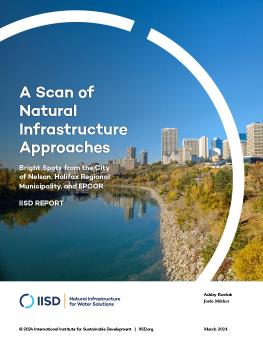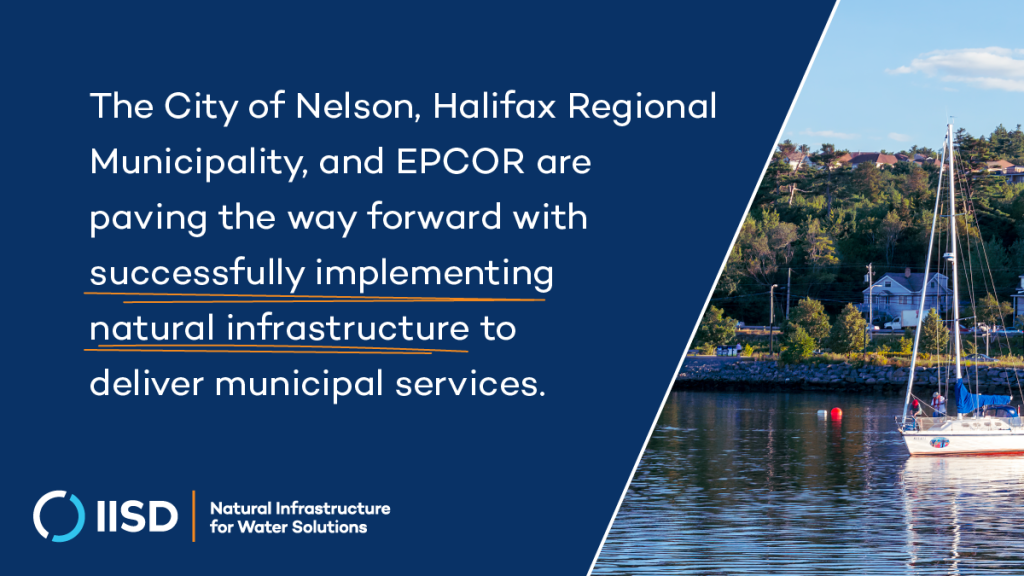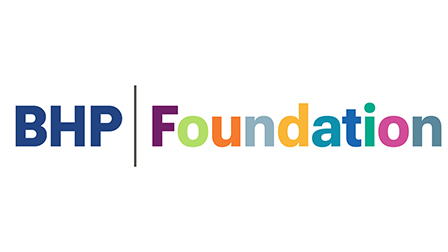
A Scan of Natural Infrastructure Approaches
Bright spots from the City of Nelson, Halifax Region Municipality, and EPCOR
This report looks at successful natural infrastructure implementation to deliver municipal services in Canadian municipalities, Identifying how Edmonton, Alberta; Nelson, British Columbia; and the Halifax Regional Municipality, Nova Scotia are paving the way.
-
Natural infrastructure, like wetlands, can complement existing grey infrastructure to enhance the delivery of municipal services.
-
Regardless of size, jurisdictions in Canada are successfully implementing natural infrastructure—through policy and planning changes, collaborating across departments and with partner organizations, and more.
-
Each jurisdiction is different and needs to develop solutions that align with its own municipal processes.
Local governments play a crucial role in providing essential services to residents, such as drinking water, wastewater treatment, stormwater management, flood protection, and rural drainage. Traditionally, these services rely on grey infrastructure, like dams, pipes, and treatment facilities. However, there is a growing interest in using natural infrastructure to complement these services, especially in response to the increasing challenges posed by climate change.
Several jurisdictions in Canada, including the City of Nelson, Halifax Regional Municipality, and EPCOR, based in Edmonton, Alberta, are taking the lead on successful natural infrastructure implementation. These cases serve as models for others, showcasing effective policy changes in different administrative, jurisdictional, and geographic settings.

Participating experts
Funded by
You might also be interested in
Funding the Future
Practical recommendations for federal infrastructure programs with 14 criteria to better enable natural infrastructure in Canada.
Climate Risk Profile—Fiji
This climate risk profile provides an overview of the Fiji's climate context, observed and projected climate change impacts, and a set of recommended NbS for adaptation actions and measures to promote gender-responsive and socially inclusive climate adaptation.
Year One of SUNCASA Progress: Lessons in Nature-Based Solutions
In its first year of implementation, the Scaling Urban Nature-based Solutions (NbS) for Climate Adaptation in Sub-Saharan Africa (SUNCASA) project has delivered significant results, laying the foundation for scaling up gender-equitable and socially inclusive climate adaptation efforts in 2025 and 2026 in Dire Dawa (Ethiopia), Kigali (Rwanda), and Johannesburg (South Africa).
“The howler monkeys are everywhere”: How women in Belize are harnessing the power of nature to conserve their community
The president of the Community Baboon Sanctuary Women’s Conservation Group in Belize River Valley talks about the environmental challenges facing their community, the group’s proudest achievements, and their aspirations for community-based conservation through nature-based solutions.
